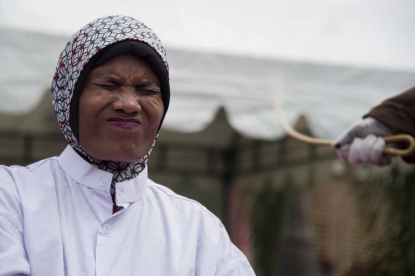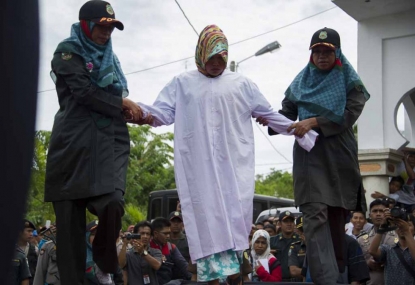Whipped by the sharia police
(AFP Photo / Chaideer Mayhuddin)
Public canings for "immoral acts" have been on the rise in Aceh, the only province in Indonesia allowed to implement Islamic sharia law. Nurdin Hasan offers a first-hand account of one such caning in the provincial capital Banda Aceh.
BANDA ACEH, Indonesia, July 13, 2015 - It's not clear if the caning itself was responsible for the young woman collapsing, or the trauma of being punished so publicly before an enormous crowd.
Lashed four times, the university student fainted as she was taken by sharia police from the stage, erected outside a mosque in downtown Banda Aceh for a public caning after Friday prayers.
She wasn't alone on the dais. Five other university students - all unwed and aged between 18 and 23 - and a woman in her 40s were paraded by sharia police and public prosecutors in front of a large crowd, their heads bowed. One man put his face in his hands, avoiding the stares and jeers.

An Acehnese woman convicted of 'immoral acts' is caned in public in Banda Aceh on June 12, 2015
(AFP Photo / Chaideer Mayhuddin)
The older woman had been charged with adultery. The three young couples were caught by sharia police alone with each other – something forbidden in Aceh outside marriage.
Such behaviour is acceptable elsewhere in Indonesia but not in this deeply-religious province, the only one in the world's most populous Muslim-majority country allowed to implement Islamic law.
Sharia in wake of tsunami
The westernmost province was granted a degree of autonomy in 2001 in a deal with Jakarta aimed at quelling a decades-long separatist movement, including the right to implement sharia law.
The devastating tsunami that struck Aceh in 2004, leaving some 170,000 dead in Indonesia and tens of thousands more in countries round the Indian Ocean, provided the impetus for the central government and rebels to finally strike a peace deal.
The province maintained its broad autonomy and has been steadily implementing a growing number of sharia regulations since.

An Acehnese woman convicted of pimping is caned in public in Banda Aceh on June 12, 2015
(AFP Photo / Chaideer Mayhuddin)
Some of the bylaws in the devout province are extreme by Western standards. Women are forced to sit sideways on motorcycles in some parts of the province because straddling is deemed lewd, and laws have been passed prohibiting unmarried couples from riding together at all.
100 whipped this year
Punks have had their heads shaved and piercings removed before being bathed in public and sent to re-education classes. Sharia police roam the streets at night in search of people committing "immoral acts", independent of the regular police force.
Canings began in 2005, and have been on the rise ever since. Roughly 100 Acehnese have been whipped this year alone.

An Acehnese woman convicted of 'immoral acts' prepares to be caned in Banda Aceh on June 12, 2015
(AFP Photo / Chaideer Mayhuddin)
Though commonplace elsewhere in Aceh, this caning was the first of the year in the bustling capital, and roughly 1,000 people had turned out for the macabre spectacle.
There are few entertainment outlets in the city, and the local authorities actively encourage citizens to get involved.
Children in the crowd
The atmosphere is rowdy in the town square as the students, clad in white gowns, are brought from the paddywagon to the stage.
Insults are hurled at those awaiting punishment. Young children are among those jostling for a view, despite being technically forbidden from attending the public events. Camera phones are held aloft for a snap.

An Acehnese woman convicted of 'immoral acts' is lashed at a public caning in Banda Aceh on June 12, 2015
(AFP Photo / Chaideer Mayhuddin)
Female officers from the sharia police, one at each arm, bring forward the women, who are knelt down as their charge is read out by a prosecutor.
Goaded to strike harder
Shrouded from head to toe in dark cloth, with a slitted mask leaving just the eyes exposed, a hooded figure - a specialist from the sharia police known as an "algojo" - steps forward bearing a metre-long length of rattan cane.
For years the algojo could raise his arm no higher than shoulder height, but that was revised in 2013 to allow for more vigorous swings.

An Acehnese man convicted of 'immoral acts' prepares for his public caning in Banda Aceh on June 12, 2015
(AFP Photo / Chaideer Mayhuddin)
Kneeling, the terrified students can do little but squeeze their eyes shut and grimace as the cane comes whizzing down. The algojo is goaded into striking harder by the crowd, and disappointment sets in if the punishment is deemed less than the offence.
Unwed people found fraternising with the opposite sex face three to nine lashes; gamblers six to 12. Those caught drinking in the devout province are threatened with 40 lashes. From October, if the Acehnese parliament agrees to a new provision, the range of acts punishable by caning will expand.

An Acehnese man convicted of 'immoral acts' is lashed by a local government officer in Banda Aceh on June 12, 2015
(AFP Photo / Chaideer Mayhuddin)
Couples caught kissing in public could face up to 45 lashes, while homosexuals found guilty of gay sex risk 100.
While the laws seem harsh on paper, many regulations are in practice not strictly enforced or followed.
The province is home to beautiful scenery and some popular spots for surfing and diving, and draws a small number of foreign visitors every year.
Overseas tourists are not exempt from sharia law, and a new regulation passed last year means Islamic regulations now apply even to non-Muslims. But there have not been reports of foreigners being punished under sharia law and Acehnese are generally welcoming of visitors as long as they dress “modestly” in public places and refrain from public displays of affection.

Acehnese women convicted of 'immoral acts' sit inside a paddywagon following their public caning in Banda Aceh on June 12, 2015
(AFP Photo / Chaideer Mayhuddin)
Many in Aceh feel the laws don't go far enough. There have been calls for officials found guilty of corruption - a common bugbear in Indonesia - to face the cane, but most know it's unlikely to happen.
Locals grumble that those in high office are spared the cane even when caught indulging in “lewd” behavior, pointing to a respected community leader who was arrested in a salon with women unrelated to him two years ago without consequence.
The students are given no such leniency. Their humiliating ordeal lasts just over an hour, until they are taken away, the crowd dispersed, and the stage dismantled.
Nurdin Hasan has been a regular contributor for AFP from Indonesia's western province of Aceh since 2000.


